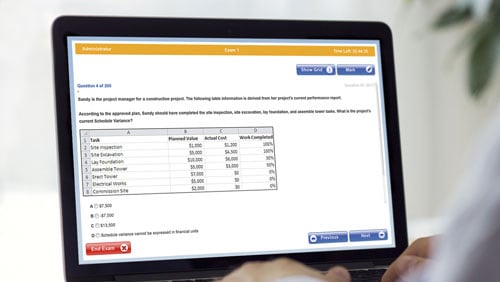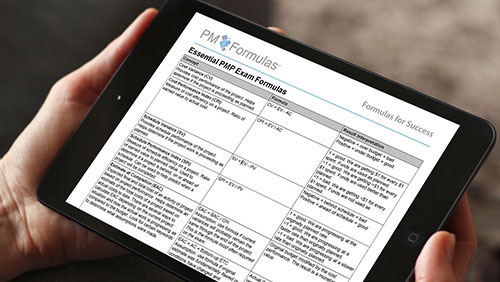The 4 Secret Ingredients to Pass the PMP® Examination
 The Project Management Professional (PMP)® exam is developed and administered by the Project Management Institute (PMI)® to measure and assess an individual’s ability to apply project management skills in six different domains. Initiation, planning, execution, monitoring and controlling, closing the project, as well as professional and social responsibility are evaluated. Don’t be intimidated! While the material may seem overwhelming, there are a few important factors to consider when preparing to successfully earn your PMP certificate. Experience, understanding of project management principles, developing a solid study plan and reliably sticking to it, as well as practicing exam-taking strategies are essential ingredients for PMP® exam success.
The Project Management Professional (PMP)® exam is developed and administered by the Project Management Institute (PMI)® to measure and assess an individual’s ability to apply project management skills in six different domains. Initiation, planning, execution, monitoring and controlling, closing the project, as well as professional and social responsibility are evaluated. Don’t be intimidated! While the material may seem overwhelming, there are a few important factors to consider when preparing to successfully earn your PMP certificate. Experience, understanding of project management principles, developing a solid study plan and reliably sticking to it, as well as practicing exam-taking strategies are essential ingredients for PMP® exam success.
Secret Ingredient #1: Project Management Experience
Perhaps one of the most solid foundations for successful completion of the PMP exam is actual project management experience. Learning on-the-job with specific situations that develop a wide array of project management skills is an excellent way to retain information and far superior to rote memorization or passive reading. PMP test takers with project management experience are able to draw upon a database of information that is relevant and often easier to retrieve due to its personal nature. Recalling the small details of that last-minute project at work that your supervisor needed yesterday makes all of those grueling hours a worthwhile investment.
Before applying to take the PMP exam, PMI® certification requires at least 4500 hours of experience in project management and 35 hours of documented training. This ensures that test-takers have the required skills to be successful and maintains the credibility of the certification.
Secret Ingredient #2: Understanding of Project Management Principles
Specific principles addressed in the PMP exam include communication, cost management, human resources, integration, procurement, quality, risk, scope, and time management. Each of these topics is covered in A Guide to the Project Management Body of Knowledge (PMBOK® Guide). You must understand them individually and how they work together to ensure overall successful project management. It is essential to use the most current version of the PMBOK® Guide for studying and review.
Secret Ingredient #3: Having a solid plan to study for the exam & sticking to it
As with all standardized examinations, the PMP covers a wide variety of material in a relatively short period of time. Don’t be discouraged! Remember that careful planning and structure are essential to your exam success. It is important to develop a PMP Exam Study Plan to reduce the amount of intimidating material into manageable portions. People often find they work well with a structured exam preparation course that provides focused instruction over a specific timeline. One of the requirements of the PMP examination (35 hours of project management instruction) can be met with an online or in-person class. If you select an online course, ensure the class provides an “end of course assessment” and gives you written certification of participation and completion of required instruction hours.
The number ant type of questions on the exam are: initiating the project (11%), planning the project (23%), executing the project (27%), monitoring and controlling the project (21%), closing the project (9%), and professional and social responsibility (9%). Many people often divide up their study time in a similar manner, giving more hours to those topics that are tested more heavily. Others take practice exams and note specific weak areas in their knowledge, choosing to focus more review time on those topics. Your plan of attack will be personal and best suited to your own strengths, weaknesses, and timeline.
Most resources recommend spending one to two hours each day for four to eight weeks in preparation. Some people will require more time and others will require less. Work out a schedule with a manageable amount of material to cover each day. Be realistic in how much can be covered in one to two hours so that the schedule can be followed closely and certain areas don’t slip, get skipped, or left out completely. Remember that most of us can’t afford to neglect our day job during this study period and still have external commitments and responsibilities. Set weekly goals and regularly take practice exams to chart your progress. It’s also very important not to forget to take refreshing breaks to do something you enjoy.
Secret Ingredient #4: PMP Exam-Taking Strategy
The PMP exam is made up of 200 multiple choice questions conducted on a computer at a Prometric testing center during normal business hours from Monday to Saturday. Test-takers are given a 15-minute tutorial and four hours to complete the exam. 25 pre-test questions remain ungraded, as they are used for future exam purposes. Inside the examination center, test takers are provided with rough sheets of paper and pencils. If needed, there are a variety of translation materials available upon request as the exam is only administered in English.
Mock questions and simulation exams are available from a variety of test preparation websites. Practice exams help future test-takers become familiar with the style and format of questions and enhance the endurance required for four-hour exams. It is commonly recommended that consistently scoring above 80% on mock exams is a strong indicator of success on the real thing. Gauge your progress on a weekly basis and determine how comfortable you feel with each topic area. Arriving on exam day with confidence means half the battle is already won.
Specific tips for test day strategies include sleeping well the night before, eating a healthy breakfast, wearing comfortable clothing, and arriving early. Before beginning the exam, many test-takers like to utilize the provided rough sheet to write out things like formulae, lists of processes with their inputs and outputs, as well as tools and techniques that will be useful throughout the exam. Consider taking two breaks spaced evenly throughout the exam. Don’t waste too much time on a single question; mark it for review and move on.
Applying these four simple steps thoroughly and intelligently will ensure that the valuable time and money spent on the PMP exam is not wasted. Successful completion of the PMP depends on a test-takers ability to put their project management experience to work, to understand and apply project management principle, to thoroughly prepare with a solid study plan, and to bring everything smoothly together on a stressful exam day. Preparation is the key to reducing stress and guaranteeing success.
Watch this video for a list of essential study materials you'll need in preparing for the pmp exam.


